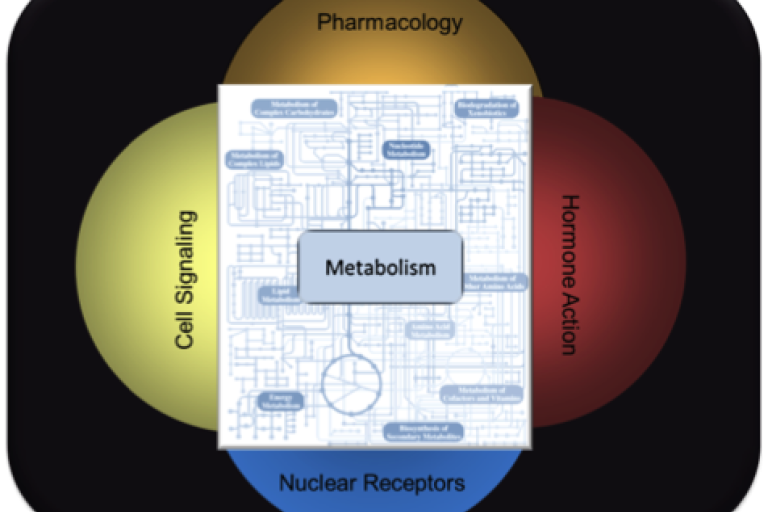
The long-term regulation of metabolism is achieved by sophisticated inputs from hormones, nuclear receptors, and cell signaling pathways, many of which are tractable pharmacologic targets. Thus, we are interested in understanding the specific influences that these factors have on regulating metabolic flux.
Metabolism can be governed by hormones or other molecules that act on nuclear receptors and transcription factors that alter gene expression. In turn, altered enzyme expression or changes in post-translational modification can alter the metabolic flux of their associated pathways.
These molecular mechanisms are important for the nutritional and hormonal regulation of metabolism. Inasmuch as many of these molecular mechanisms are disrupted by disease, an important goal is to understand precisely how they act on metabolic flux.
The Burgess lab has investigated how hormones (e.g. insulin, glucagon, FGF-21), signaling pathways (e.g. insulin signaling, mTORC1), and molecular factors (e.g. PPARa, Pgc1a, Pgc1b) alter metabolic flux in pathways of glucose, lipid, and energy metabolism.
In addition, we have examined how pharmacological interventions (e.g. bile acid sequestration, fibrates, metformin) that target various molecular components alter metabolic pathways related to obesity and diabetes.
References
Baskin KK, Grueter CE, Kusminski CM, Holland WL, Bookout AL, Satapati S, et al. MED13-dependent signaling from the heart confers leanness by enhancing metabolism in adipose tissue and liver. EMBO Molecular Medicine. 2014;6(12):1610-21. PMID: 25422356; PMCID:PMC4287978.
Zechner JF, Mirshahi UL, Satapati S, Berglund ED, Rossi J, Scott MM, et al. Weight-independent effects of roux-en-Y gastric bypass on glucose homeostasis via melanocortin-4 receptors in mice and humans. Gastroenterology. 2013;144(3):580-90 e7. PMID: 23159449; PMCID:3835150.
Wan M, Leavens KF, Hunter RW, Koren S, von Wilamowitz-Moellendorff A, Lu M, et al. A noncanonical, GSK3-independent pathway controls postprandial hepatic glycogen deposition. Cell Metab. 2013;18(1):99-105. PMID: 23823480; PMCID:3725134.
Potthoff MJ, Potts A, He T, Duarte JA, Taussig R, Mangelsdorf DJ, et al. Colesevelam suppresses hepatic glycogenolysis by TGR5-mediated induction of GLP-1 action in DIO mice. American Journal of Physiology Gastrointestinal and Liver Physiology. 2013;304(4):G371-80. PMID: 23257920; PMCID:3566618.
Lee Y, Berglund ED, Wang MY, Fu X, Yu X, Charron MJ, et al. Metabolic manifestations of insulin deficiency do not occur without glucagon action. PNAS USA. 2012;109(37):14972-6. PMID: 22891336; PMCID:3443167.
Chambers KT, Chen Z, Crawford PA, Fu X, Burgess SC, Lai L, et al. Liver-specific PGC-1beta deficiency leads to impaired mitochondrial function and lipogenic response to fasting-refeeding. PloS One. 2012;7(12):e52645. PMID: 23285128; PMCID:3532159.
Potthoff MJ, Boney-Montoya J, Choi M, He T, Sunny NE, Satapati S, et al. FGF15/19 regulates hepatic glucose metabolism by inhibiting the CREB-PGC-1alpha pathway. Cell Metab. 2011;13(6):729-38. PMID: 21641554; PMCID:3131185.
Kucejova B, Sunny NE, Nguyen AD, Hallac R, Fu X, Pena-Llopis S, et al. Uncoupling hypoxia signaling from oxygen sensing in the liver results in hypoketotic hypoglycemic death. Oncogene. 2011;30(18):2147-60. PMID: 21217781; PMCID:3135264.
Potthoff MJ, Inagaki T, Satapati S, Ding X, He T, Goetz R, et al. FGF21 induces PGC-1alpha and regulates carbohydrate and fatty acid metabolism during the adaptive starvation response. PNAS. 2009;106(26):10853-8. PMID: 19541642.
Zhao G, Jeoung NH, Burgess SC, Rosaaen-Stowe KA, Inagaki T, Latif S, et al. Overexpression of pyruvate dehydrogenase kinase 4 in heart perturbs metabolism and exacerbates calcineurin-induced cardiomyopathy. American Journal of Physiology Heart and Circulatory Physiology. 2008;294(2):H936-43. PMID: 18083902.
Satapati S, He T, Inagaki T, Potthoff M, Merritt ME, Esser V, et al. Partial resistance to peroxisome proliferator-activated receptor-alpha agonists in ZDF rats is associated with defective hepatic mitochondrial metabolism. Diabetes. 2008;57(8):2012-21. PMID: 18469201.
Rogoff D, Ryder JW, Black K, Yan Z, Burgess SC, McMillan DR, et al. Abnormalities of glucose homeostasis and the hypothalamic-pituitary-adrenal axis in mice lacking hexose-6-phosphate dehydrogenase. Endocrinology. 2007;148(10):5072-80. PMID: 17656460.
Inagaki T, Dutchak P, Zhao G, Ding X, Gautron L, Parameswara V, et al. Endocrine regulation of the fasting response by PPARalpha-mediated induction of fibroblast growth factor 21. Cell Metab. 2007;5(6):415-25. PMID: 17550777.
Burgess SC, Leone TC, Wende AR, Croce MA, Chen Z, Sherry AD, Malloy CR, Finck BN. Diminished hepatic gluconeogenesis via defects in tricarboxylic acid cycle flux in peroxisome proliferator-activated receptor gamma coactivator-1alpha (PGC-1alpha)-deficient mice. JBC. 2006;281(28):19000-8. PMID: 16670093.